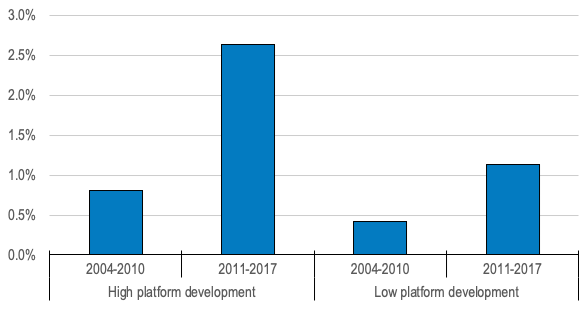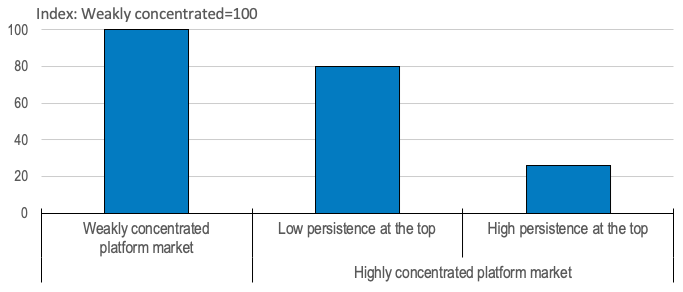Over the past decade, online platforms have acquired a central role as intermediaries between service providers and consumers in many industries, such as personal transport, accommodation, retail trade, food services, finance, personal services or entertainment. Platforms profoundly transform the functioning of these industries, but so far there is little systematic cross-country evidence on their economic effects. Existing empirical studies typically focus on single platforms and countries. Their insights are interesting, but difficult to generalise. For example, Berger et al. (2018) show that the arrival of Uber in new US cities reduces taxi drivers’ earnings. Cramer and Krueger (2016) show that Uber drivers have a higher capacity utilisation rate than traditional taxi drivers in five cities in the US, while Liu et al. (2018) find that they make fewer detours. For another segment of the economy, Anderson and Magruder (2012) show that restaurants with good ratings on Yelp.com in San Francisco receive more demand. In the area of hotels and tourism, Mayzlin et al. (2014) investigate online review manipulation on Expedia and TripAdvisor in large US cities and Hunold et al. (2018) mainly focus on the effect of a ban on Booking.com’s best price clauses in Germany.
Exploring the impact of platforms on incumbent firms
In our new research (Bailin Rivares et al., 2019), we explore more systematically the impact of platform development on incumbent service firms, particularly focusing on how platforms affect productivity and the efficiency of labour allocation across firms.
From a theoretical standpoint, one can think of several channels through which online platforms may affect service firms’ productivity. First, platforms connecting service providers to consumers may bring efficiency gains in certain side activities, such as the management of bookings and processing of payments. They may also enhance capacity utilisation by making the real time availability of service visible online. Beyond that, the emergence of new types of providers enabled by platforms, as well as the rising availability of consumer reviews and ratings, are likely to enhance competition between service providers, which may stimulate their productivity.
A major challenge to exploring the economic effects of platform development is the lack of comparable data on platform use across countries and industries. The first step of our analysis therefore consists in building a novel proxy indicator of platform development, relying on detailed search data from Google Trends on the relative popularity of different keywords in Google search queries. Focusing on four service industries where platforms have gained importance – hotels, restaurants, taxi services, and retail trade – and ten OECD countries, we first identify the most important platforms operating in each industry and country. Then we construct a proxy indicator of overall platform use for each country, industry, and year by summing the share of Google searches including the name of these key platforms. This proxy measure has the major advantage that it can identify the timing of platform take-up in each country and industry, overcoming the limitations of the financial accounts of platforms, which generally report their activity only at the global level.
As illustrated by Figure 1, platform development has been remarkably fast on average since the mid-2000s, but the exact timing of their take-off differs significantly across countries and industries (Figure 2). While online platforms for retail trade had already emerged in the early 2000s, they developed later for hotels, then for restaurants, and only more recently in the taxi market, although their penetration differs across countries.
Figure 1 Online platforms have developed rapidly over the past decade
Platform development by country, based on the number of Google searches
Note: Popularity of the largest relevant platforms in each industry, based on the number of Google searches for each platform (as a share of total Google searches in each country). Unweighted average of the four selected industries (hotels, restaurants, taxis and retail trade). “Early adopting countries” is the unweighted average of the five countries in the sample with above-average platform development (France, Italy, Spain, United Kingdom and United States). “Other countries” is the unweighted average of the five other countries in the sample (Belgium, Germany, Hungary, Poland and Sweden).
Source: Bailin et al. (2019), based on Google Trends data.
Figure 2 Platforms emerged at different times in different countries and industries
Note: The retail sector is an unweighted average of the five retail subsectors considered (books, shoes, cosmetics/perfumes, watches/jewellery, and toys). For each sector (and each retail subsector), values are normalised to one for the country and year with the highest platform use (usually 2017, but an earlier year in certain retail subsectors).
Source: Bailin et al. (2019), based on Google Trends data
Relying on this cross-country, industry, and time variation, we estimate the impact of platform development on the productivity of existing firms operating in these service industries. We do so by exploiting a cross-country harmonised dataset on firm-level productivity (based on Orbis), which is matched to our platform development indicator at the detailed 4-digit industry level.
Our findings
Overall, platform development is found to support productivity of the average incumbent service firm (Figure 3). Beyond this, we also find that platforms tend to improve allocative efficiency by stimulating labour reallocation towards the most productive service firms, possibly because better-rated firms tend to attract more demand. Both of these effects support aggregate productivity in these industries, which is particularly welcome as they traditionally have relatively poor productivity performance.
Figure 3 Impact of platform development on the productivity of service providers
Note: The figure presents the estimated effect of platform development on multi-factor productivity of the average service firm, on average across selected industries (hotels, restaurants, taxis and retail) and in two groups of countries. “High platform development” is the average of the five countries where the platform development indicator is above median on average over the 2004-17 period (France, Italy, Spain, United Kingdom, United States), while “Low platform development” is the average of the five other countries in the sample (Belgium, Germany, Hungary, Poland, Sweden). These averages do not take into account that effects of platforms can vary depending on structural and policy factors.
Source: Bailin et al. (2019), based on ORBIS and Google Trends.
However, these effects depend crucially on the type of platform considered. We distinguish two main types of platforms:
- platforms operating mainly as ‘aggregators’ of existing service providers’ offers (e.g. Booking.com, TheFork), and
- more ‘disruptive’ platforms enabling new types of providers that compete to some extent with existing ones (e.g. Uber, Airbnb).
While the former type of platform is found to have a significant positive impact on the productivity of existing service providers, we find on average no significant effect (either positive or negative) for the latter.
Policy implications
The effects of platform development moreover depend heavily on structural and policy factors, with first-order implications for policies. First, platform markets are often extremely concentrated as they feature strong multi-sided network effects. However, we find that the productivity gains induced by ‘aggregator’ platforms are reduced when a platform is persistently dominant on its market (Figure 4), suggesting that contestability of platform markets should be promoted, for example by reducing switching costs between platforms and via strict enforcement of competition policy tools.
Figure 4 Contestable platform markets are associated with stronger productivity gains
Effect of platform development on average service firm productivity, depending on the structure of the platform market
Note: Estimated impact based on the average change in the platform indicator in each country and sector over 2004-16. Weakly (highly) concentrated indicates that the market share of the largest platform is below (above) the median in the sample. High persistence indicates that the largest platform was already the largest in the two previous years. The first two bars are not statistically different from each other, whereas the third one is significantly lower than the first one.
Source: Bailin et al. (2019), based on ORBIS and Google Trends.
Finally, other policies, not directly related to platforms, may also influence the productivity impact of platforms on service firms. In particular, we find that strict product and labour market regulations hinder the productivity of incumbent service firms when platforms develop, possibly because they reduce firms’ ability to adjust to a rapidly changing economic environment. This calls for reassessing regulations in the light of platform development. Certain rules that have become obsolete or unduly protect incumbents should be eliminated, while the new types of service providers enabled by platforms should gradually be submitted to tax and regulatory rules equivalent to those in activities they compete with, so as to ensure a level playing field.
References
Anderson, M and J Magruder (2012), “Learning from the Crowd: Regression Discontinuity Estimates of the Effects of an Online Review Database”, Economic Journal 122: 957–989.
Bailin Rivares, A, P Gal, V Millot and S Sorbe (2019), "Like it or not? The impact of online platforms on the productivity of incumbent service providers", OECD Economics Department Working Papers, No. 1548. https://doi.org/10.1787/080a17ce-en
Berger, T, C Chen and C Frey (2018), “Drivers of disruption? Estimating the Uber effect”, European Economic Review 110: 197-210.
Cramer, J and A Krueger (2016), “Disruptive Change in the Taxi Business: The Case of Uber”, NBER Working Paper No. 22083.
Hunold, M, R Kesler, U Laitenberger and F Schüttler (2018), “Evaluation of best price clauses in online hotel bookings”, International Journal of Industrial Organization 61: 542-571.
Liu, M, E Brynjolfsson and J Dowlatabadi (2018), “Do digital platforms reduce moral hazard? The case of Uber and taxis”, NBER Working Paper No. 25015.
Mayzlin, D, Y Dover and J Chevalier (2014), “Promotional Reviews: An Empirical Investigation of Online Review Manipulation”, American Economic Review 104(8): 2421-2455.










